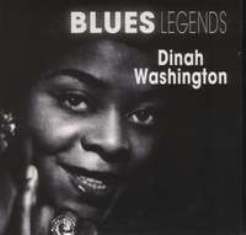Blues Legends - Dinah Washington
Blues Legends - Dinah Washington

1. Go Pretty Daddy (Sanford, Medley) - 2:23
2. TV is the Thing (Sanford, Medley) - 2:27
3. Feel like I Wanna Cry (Kirkland) - 3:19
4. Lean Baby (May, Alfred) - 2:17
5. Never, Never (Kirkland, Luke) - 2:15
6. I Ain't Goin' To Cry Anymore (Sanford, Medley) - 2:38
7. Am I Blue (Akst) - 3:14
8. Pennies from Heaven (Johnson, Burke) - 2:17
9. Set Me Free (Sanford, Medley) - 2:29
10. Since My Man Had Gone and Went (Merrick) - 2:03
11. My Man's An Undertaker (Kirkland, Thomas) - 2:30
12. My Song (Hendersun, Brown) - 2:56
13. Mad about the Boy (Coward) - 2:59
14. Stormy Weather (Arlen, Koehler) - 3:02
15. Ain't Nothin' Good (Fox, Friedman) - 2:54
16. I Challenge Your Kiss (Paul, Gary) - 3:11
17. I'm Crying (Sherry, Baron, Koehler) - 2:42
18. I Can't Face the Music (Bloom, Koehler) - 2:47
19. Don't Get Around Much Anymore (Russell, Ellington) - 3:08
20. Fat Daddy (Sanford, Medley) - 2:25
Dinah Washington was at once one of the most beloved and controversial singers of the mid-20th century -- beloved to her fans, devotees, and fellow singers; controversial to critics who still accuse her of selling out her art to commerce and bad taste. Her principal sin, apparently, was to cultivate a distinctive vocal style that was at home in all kinds of music, be it R&B, blues, jazz, middle of the road pop -- and she probably would have made a fine gospel or country singer had she the time. Hers was a gritty, salty, high-pitched voice, marked by absolute clarity of diction and clipped, bluesy phrasing. Washington's personal life was turbulent, with seven marriages behind her, and her interpretations showed it, for she displayed a tough, totally unsentimental, yet still gripping hold on the universal subject of lost love. She has had a huge influence on R&B and jazz singers who have followed in her wake, notably Nancy Wilson, Esther Phillips, and Diane Schuur, and her music is abundantly available nowadays via the huge seven-volume series The Complete Dinah Washington on Mercury.
Born Ruth Lee Jones, she moved to Chicago at age three and was raised in a world of gospel, playing the piano and directing her church choir. At 15, after winning an amateur contest at the Regal Theatre, she began performing in nightclubs as a pianist and singer, opening at the Garrick Bar in 1942. Talent manager Joe Glaser heard her there and recommended her to Lionel Hampton, who asked her to join his band. Hampton says that it was he who gave Ruth Jones the name Dinah Washington, although other sources claim it was Glaser or the manager of the Garrick Bar. In any case, she stayed with Hampton from 1943 to 1946 and made her recording debut for Keynote at the end of 1943 in a blues session organized by Leonard Feather with a sextet drawn from the Hampton band. With Feather's "Evil Gal Blues" as her first hit, the records took off, and by the time she left Hampton to go solo, Washington was already an R&B headliner. Signing with the young Mercury label, Washington produced an enviable string of Top Ten hits on the R&B charts from 1948 to 1955, singing blues, standards, novelties, pop covers, even Hank Williams' "Cold, Cold Heart." She also recorded many straight jazz sessions with big bands and small combos, most memorably with Clifford Brown on Dinah Jams but also with Cannonball Adderley, Clark Terry, Ben Webster, Wynton Kelly, and the young Joe Zawinul (who was her regular accompanist for a couple of years). In 1959, Washington made a sudden breakthrough into the mainstream pop market with "What a Diff'rence a Day Makes," a revival of a Dorsey Brothers hit set to a Latin American bolero tune. For the rest of her career, she would concentrate on singing ballads backed by lush orchestrations for Mercury and Roulette, a formula similar to that of another R&B-based singer at that time, Ray Charles, and one that drew plenty of fire from critics even though her basic vocal approach had not changed one iota. Although her later records could be as banal as any easy listening dross of the period, there are gems to be found, like Billie Holiday's "Don't Explain," which has a beautiful, bluesy Ernie Wilkins chart conducted by Quincy Jones. Struggling with a weight problem, Washington died of an accidental overdose of diet pills mixed with alcohol at the tragically early age of 39, still in peak voice, still singing the blues in an L.A. club only two weeks before the end. ---Richard S. Ginnel, allmusic.com
download (mp3 @VBR kbs):
yandex mediafire ulozto gett bayfiles
Zmieniony (Środa, 16 Wrzesień 2020 08:17)








